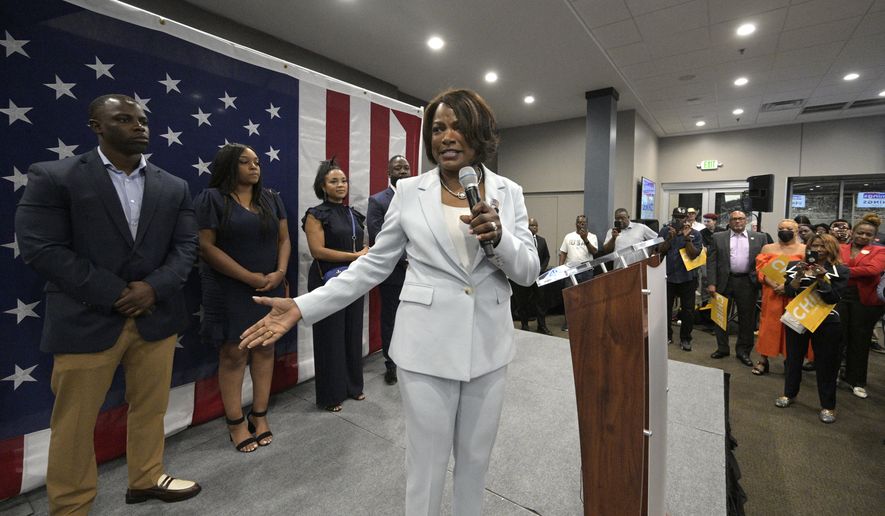Democrats running in House and Senate races have ditched talk about climate change and green energy policies as voters signal that the economy, high gas and heating prices, illegal immigration and abortion will influence them the most at the ballot box on Nov. 8.
Climate change has long been a top issue among the base of Democratic voters and a smaller but significant number of independents, and campaigns could be promoting the $700 billion climate and tax bill that President Biden recently signed. The law is aimed at curbing carbon emissions through massive spending on green energy projects.
Voters have all but cast aside climate change and are telling Democrats they are struggling to pay for groceries and gas or worried about abortion access.
A Monmouth University poll this week showed climate change among the three least important issues — along with COVID-19 and student loan debt — although 49% considered it “extremely or very important.”
The number of respondents who said climate change was “not important” for the federal government to address doubled from 16% in January 2021, when Mr. Biden took office, to 32%.
Still, a new issue has crept up the list: abortion.
“It does feel as though climate has lost the limelight this midterm to Roe, which is a shame,” Democratic Party strategist Christy Setzer said in reference to the Supreme Court decision in June that ended the nationwide legal right to abortion.
Climate change, Ms. Setzer said, “is often a key factor in younger voters’ enthusiasm for candidates and a first step into civic engagement.”
The Monmouth poll of 806 adults, most of them registered voters, found inflation (82%), crime (72%) and elections and voting (70%), topped the list of concerns.
Still, 56% of respondents in the Monmouth poll indicated that abortion was “extremely or very important.” Other surveys show a similar trend.
A St. Anselm College poll conducted Sept. 27-28 found abortion ranked third behind the economy and inflation among registered voters. Since August, the share of voters who called abortion a top issue rose from 12% to 20%.
Democratic candidates are honing their campaign strategies accordingly.
The party has struggled to deflect blame for inflation, high gas prices and the surge of illegal immigrants across the southern border, so they are going after Republicans on abortion access. The issue has animated the Democrats’ base since the high court ruling in June.
Democrats are spending tens of millions of dollars on ads across the country, but not on climate change messages. Instead, they are portraying the Republican Party as extreme, punitive and a threat to reproductive rights.
In Florida, where the environment often ranks as a top concern, Democrat Val Demings isn’t campaigning on climate change or the green energy and tax increase package she helped pass this summer in Congress. In her bid to unseat Republican Sen. Marco Rubio, Mrs. Demings is promoting her support for abortion access and her law and order platform.
In one ad, she combines the two.
“As a police officer, some of the worst cases I worked were sexual assaults,” Mrs. Demings says in the ad. “Marco Rubio wants to criminalize abortions with no exceptions for victims of rape or incest.”
Mrs. Demings and other Democrats are watching polls like the Spectrum News/Siena College survey, which found only 1 in 4 likely Florida voters ranked climate change among their top three issues. Although half of voters ages 18-34 listed climate change among their top three concerns, young voters are historically less likely to turn out at the polls.
Sen. Michael F. Bennet, a Colorado Democrat up for reelection in a state where voters have long prioritized the environment, tied the economy and climate together in a recent ad touting solar panel manufacturing.
The climate issue itself won’t win voters on the fence this election cycle amid economic woes and the abortion debate, and Democrats know it, said Hank Sheinkopf, a Democratic Party strategist.
When asked about Mr. Biden’s handling of climate change, voters mostly disapprove, the Monmouth poll found.
“There’s a clash in discussions between the economy and climate issues,” Mr. Sheinkopf said. “It’s best for people who want to hold on to seats or win seats not to confuse the two. The economy is a problem for an awful lot of people. Inflation is a problem. You throw climate on top of that, it’s kind of a souffle [Republicans] can really put a fork into this fall.”
Despite the polls, climate activist groups are not abandoning the midterms.
Seeing an opportunity to drive climate-concerned voters to the polls, environmental groups Climate Power Action and the League of Conservation Voters Victory Fund have pledged $14 million in climate-focused ads promoting more than two dozen Democrats in competitive House and Senate races.
A coalition of eight Senate Democrats, none of them running for reelection, has reignited a longtime push for Mr. Biden to declare an official climate emergency to unlock more executive powers to curb carbon emissions.
The climate hawks argued in a letter Tuesday that an emergency declaration would turn their tax and climate spending law into the start of an “ambitious climate agenda, not the end of it.”
These Senate Democrats ranked climate change among “the biggest emergencies that our country has ever faced.” They urged Mr. Biden to “act boldly, declare this crisis the national emergency that it is, and embark upon significant regulatory and administrative action.”
• Ramsey Touchberry can be reached at rtouchberry@washingtontimes.com.




Please read our comment policy before commenting.